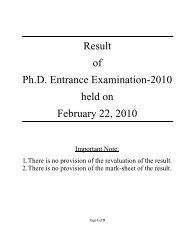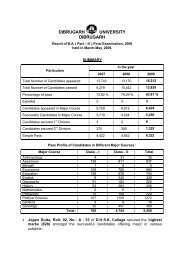Document file:///D|/Export1/www.netlibrary.com/nlreader/nlreader.dll ...
Document file:///D|/Export1/www.netlibrary.com/nlreader/nlreader.dll ...
Document file:///D|/Export1/www.netlibrary.com/nlreader/nlreader.dll ...
You also want an ePaper? Increase the reach of your titles
YUMPU automatically turns print PDFs into web optimized ePapers that Google loves.
<strong>Document</strong><br />
Page 41<br />
But why didn't some clever economist in the Anglo-Saxon tradition pick up central-place theory and<br />
produce a formal model? For some length of time, say up to the mid-1950s, simple ignorance can be the<br />
explanation: the German location tradition was simply not accessible to non-German-speaking theorists.<br />
After the proselytizing work of Isard and others, however, the essential ideas of central-place theory<br />
were there ready for theoretical elaboration. And indeed some very talented theorists did make attempts<br />
to formalize the framework. Yet these attempts did not succeed, at least as judged by the test of the<br />
intellectual marketplace.<br />
Why? You know the answer: to make sense of central-place theory, one needs to deal with the problem<br />
of market structure. The idea is simple enough: each firm faces a trade-off between economies of scale,<br />
which push toward a limited number of production sites, and transport costs, which can be reduced by<br />
multiplying the number of sites. But this description immediately implies that we are in a world in<br />
which there are unexhausted economies of scale, and thus in a world of imperfect <strong>com</strong>petition. You<br />
can't tell a <strong>com</strong>plete story about central-place formation unless you are prepared to offer some<br />
description, however stylized, of that imperfectly <strong>com</strong>petitive market structure. And that, until<br />
relatively recently, was something economists felt unable to do.<br />
Let me make clear that all this is not meant as a condemnation of those who developed and elaborated<br />
central-place theory. On the contrary, they should be celebrated for the inspired and productive insights<br />
they achieved in spite of their inability to formalize their ideas effectively. But central-place theory will<br />
not truly <strong>com</strong>e into its own until the formalization barrier is crossed.<br />
<strong>file</strong>:///<strong>D|</strong>/Export2/<strong>www</strong>.<strong>netlibrary</strong>.<strong>com</strong>/<strong>nlreader</strong>/<strong>nlreader</strong>.<strong>dll</strong>@bookid=409&<strong>file</strong>name=page_41.html [4/18/2007 10:30:12 AM]
















